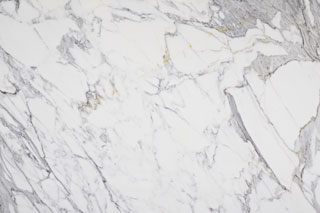
By choosing the most suitable material for bathroom countertops, flooring and back-splashes, the appearance of the room can be greatly improved, while also increasing the functionality of the space.
To select the most appropriate natural stone tiles for a bathroom, one must ensure they can stand up against exposure to moisture, heat from blow dryers, curling irons and flat irons, and an assortment of products that can harm surfaces, such as toothpaste and nail polish remover. All of these items can contribute to the staining, scratching or eroding of bathroom tiles. Luckily, there are several different types of bathroom tiles available on the market today, all of which have their own pros and cons to consider.
Inclusive of tiles, there is a wide range of materials used within the bathroom, such as:
Of the above, granite, marble and ceramic tiles tend to receive the most interest from homeowners and designers looking to renovate bathroom spaces with a natural stone. However, the most popular alternative to natural stone is solid surfaces like cast acrylic. In order to choose a material, homeowners must decide if natural stone or man-made materials will best suit the needs of their family.
Man-Made: Cast Acrylic
Cast acrylic materials are identified as "solid surfacing", meaning they are a type of inorganic material typically used to mimic the appearance of natural stone products. Cast acrylic is most often used for kitchen or bathroom countertops and is usually about half an inch thick, with over one hundred different colours and patterns to choose from. Recently, solid-surfaces that appear to be glass or quartz have been made available to consumers.
There are two main reasons why one may wish to use cast acrylic when installing washroom or kitchen countertops. One of these benefits is the fact that the solid surface is consistent throughout the piece. This means that, unlike other man-made materials like laminates, solid-surface materials do not consist of a thin decorative layer with a different founding layer. This makes stains and scratches much easier to deal with in comparison to other materials, both inorganic and natural. Issues like stains or scratches can simply be removed by sanding down solid-surface countertops. The second main benefit of solid-surface countertops is the ability to easily incorporate sinks, making it an ideal choice for individuals who prefer a seamless appearance and style.
For Many, Natural Stone Tiles are the First Choice for the Bathroom
Natural stone materials still appear to be the first choice in bathroom and kitchen tiles, whether for floors, vanities, counters or back-splashes. This is mainly because of the aesthetic appeal and value associated with natural stone pieces. Although upon purchase natural stone tends to be more costly than man-made materials, natural stone tiles will significantly improve the value of a space or home, a level of value that is not usually achieved with mad-made products.
Natural stone tiles are ideal because of their customizability. They can be used within all types of spaces, can fit any layout and will work well around any shape or size of sink, tub or shower.
Granite tiles are especially resistant to heat, stains, chipping and scratching, although they are not completely invulnerable. With the proper care and cleaning techniques, the level of resistance can be maintained and will help prevent any staining or scratching. Furthermore, if a natural stone tile does get chipped for example, the individual tile piece can be replaced without harming the remaining tiles.